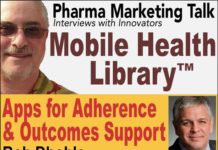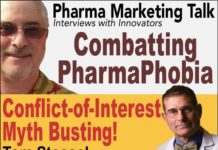Collaborating with Online Physician Communities Pharma-Physician Peer-to-Peer Dialog via SermoClick Here for Additional Resources
A conversation with Daniel Palestrant, Founder & Chief Executive Officer, Sermo.Aired LIVE on:
Friday, October 19, 2007 Listen to internet radio with Pharmaguy on Blog Talk Radio
You may also visit this Pharma Marketing Talk Segment Page to listen to the audio podcast.
This show and ALL Pharma Marketing Talk shows are available as podcasts via PMT on iTunes (FREE!).
BackgroundPfizer Inc and Sermo, the nation’s largest online physician community, today announced a strategic collaboration designed to redefine the way physicians in the U.S. and the healthcare industry work together to improve patient care. Sermo is a Web-based community where physicians share observations from daily practice, discuss emerging trends and provide new insights into medications, devices and treatments.
Through this collaboration, Sermo’s community of physicians will have access to Pfizer’s clinical content in tangible ways that allow for the transparent and efficient exchange of knowledge. With access to the most comprehensive and up-to-date information on Pfizer products, physicians will be able to find the data they need, when they need it, to make informed decisions.
Pfizer plans to pursue a number of other objectives through its collaboration with Sermo, including:
- Discover, with physicians, how best to transform the way medical information is exchanged in the fast-moving social media environment
- Create an open and transparent discussion with physicians through the innovative channel offered by online exchange
- Engage with the FDA to define guidelines for the use of social media in communications with healthcare professionals
- Work with physicians to develop a productive exchange between pharmaceutical professionals and the Sermo community
Click Here for Additional Resources
Guest Bio
 Daniel Palestrant
Daniel Palestrant
Daniel Palestrant is Founder and Chief Executive Officer of Cambridge-based Sermo, Inc. As CEO, Daniel is responsible for the overall vision of the Sermo community and business. His main tasks focus on ensuring that Sermo is a valuable resource to physicians while building a profitable and socially responsible enterprise. Daniel’s first experiences with Healthcare Informatics came when he conceived, designed, proposed and managed deployment of CIBUR (CIGNA Internet Based Universal Resource), one of the first commercial Web-based healthcare resources for physicians and allied health professionals. No stranger to the entrepreneurial side of medicine, Daniel founded his first company, Azygos, Inc., in 1998. During that time, he successfully raised $2.2MM in funding and deployed the company’s first clinical application on schedule and on budget, before selling the company to BioNetrix in May of 2001. After selling Azygos, Daniel joined BioNetrix (Now BNX Systems) as Director of Health Care. During his time at BNX Systems, Daniel helped numerous healthcare-focused businesses increase network security, improve patient privacy safeguards and comply with HIPAA. Daniel has done clinical and laboratory research in transplant immunology. He has a B.S. in biology from Johns Hopkins University, completed medical school at Duke University, and trained in General Surgery at Beth Israel-Deaconess Hospital, in Boston before leaving to launch Sermo.
Some Questions/Topics Discussed
- Please describe some of the details of this collaboration. Do only Pfizer physician employees have access to Sermo?
- Are you pursuing similar deals with other pharma companies?
- Some commenters have worried that pharma companies that have access to Sermo members and discussion boards will use it to promote off-label uses of their products. Is that a concern? If so, why? If not, why not?
- The press release indicates that FDA will be consulted regrading guidelines for the use of social media in pharma communications with healthcare professionals. Is Sermo involved in these discussions? What’s your approach to guidelines? Do you have any thoughts on some specific guidelines you’d like to see FDA or Sermo develop and promote?
- What benefit does Pfizer get from this collaboration? For example, do you see Pfizer recruiting Sermo members as consultants or for clinical trials?
- What Benefit do Sermo members get from this collaboration? What have Sermo members been saying about this collaboration?
Additional Resources









![6 Digital Tools at the Center of Healthcare Digitalization [INFOGRAPHIC]](http://ec2-54-175-84-28.compute-1.amazonaws.com/pharma-mkting.com/wp-content/uploads/2021/04/6DigitalTools_600px-100x70.jpg)




